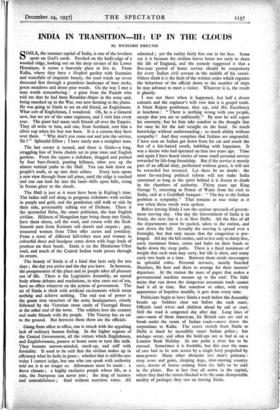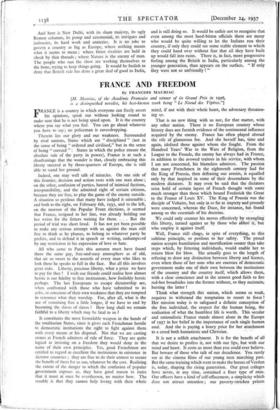INDIA IN TRANSITION-III: UP IN THE CLOUDS
By RICHARD FREUND
SIMLA, the summer capital of India, is one of the loveliest spots on God's earth. Perched on the knife-edge of a wooded ridge, looking out on the deep ravines of the Lower Himalayas, it seems a heavenly place to live in. From Kalka, where they have a Moghul garden with fountains and waterfalls of exquisite beauty, the road winds up seven thousand feet through a grandiose landscape of bare rocks, green meadows and dense pine woods. On the way I met a man worth remembering : a giant from the Punjab who told me that he had been Rissaldar-Major in the army and, being smashed up in the War, was now farming in the plains. He was going to Simla to see an old friend, an Englishman. What sort of Englishman, I wondered. Oh, he is a General now, but we are of the same regiment, and I visit him every year. The giant had many such friends all over the Empire. They all write to him, and one, from Scotland, sent him a silver cup when his boy was born. It is a custom they have over there. " Why don't you come out and join the service, Sir ? " Splendid fellow ; I have rarely met a straighter man.
The last corner is turned, and there is Simla—a long, straggling line of Swiss chalets set in pine trees and English gardens. From the square a rickshaw, dragged and pushed by four bare-footed, panting hillmen, takes you up the almost vertical paths to the Mall. You can look down on people's roofs, or up into their cellars. Every turn opens a new view through those tall pines, until the ridge is reached and one can look far into the land—hills upon hills, rising in frozen glory to the clouds.
The Mall is just as it must have been in Kipling's time. The ladies still roll along in gorgeous rickshaws with coolies in purple and gold, and the gentlemen still walk or ride by their side, presumably talking out of Dickens. There is the spectacled Babu, the smart politician, the lean English civilian. Hillmen of Mongolian type bring sheep into Simla, have them shorn, sell the wool, and return with the flock. Smooth men from Kashmir sell shawls and carpets ; gay, trousered women from Tibet offer curios and jewellery. From a score of different hill-tribes men and women in colourful dress and headgear come down with huge loads of produce on their heads. Simla is on the Hindustan-Tibet road, and much of the Central Indian trade passes through its streets.
The beauty of Simla is of a kind that lasts only for two days ; the day you arrive and the day you leave. In between, the pompousness of the place and its people takes all pleasure out of life. There is the Legislative Assembly, an unreal body whose debates and resolutions, in nine cases out of ten, have no effect whatever on the actions of government. The air of Simla is thick with artificial excitements which mean nothing and achieve nothing. The real seat of power is the gaunt iron structure of the army headquarters, closely followed by the Victorian stone castle of Viceregal House at the other end of the town. The soldiers love the country and make friends with the people. The Viceroy has an ear to the ground. But between them there are the officials.
Going from office to -office, one is struck with the appalling lack of ordinary human feeling. In the higher regions of the Central Government, all the virtues which Englishmen, and Englishwomen, possess at home seem to turn like milk. They become narrow-minded, stuck-up, and stiff with formality. It used to be said that the civilian makes up in efficiency what he lacks in grace ; whether that is still the case today I cannot judge, but one who can speak with authority told me it is no longer so. Allowances must be made : a fierce climate ; a highly exclusive people whose life, as a rule, the European can never join ; the drag of laziness and untruthfulness ; food without nutritive value. All admitted ; yet the reality fairly hits one in the face. Some say it is because the civilian leaves home too early to share the life of England, and the remedy suggested is that a five-year period of home service should be compulsory for every Indian civil servant in the middle of his career. Others think it is the fault of the written codes which regulate the behaviour of the official down to the number of steps he may advance to meet a visitor. Whatever it is, the result is ghastly.
I was not there when it happened, but half a dozen colonels and the engineer's wife vow that it is gospel truth.
A blunt Rajput gentleman, they say, told His Excellency at luncheon : " There is nothing wrong with you people, except that you are so unfriendly." By now he will regret his enormity, but let him take comfort in the thought that for once he hit the nail straight on the head. So much knowledge without understanding ; so much ability without sympathy ! And they complain that Indians are ungrateful.
I have seen an Indian get down from his car and touch the feet of a fair-haired youth, babbling with happiness. It was a doctor who had operated on him two years ago. Time and again I have heard stories of some small personal service rewarded by life-long friendship. But if the service is merely part of an official duty, performed without grace, it will not be rewarded but resented. Let there be no doubt : the most far-reaching political reform will not make India contented so long as the spirit behind it is frozen to death in the chambers of authority. Thirty years ago King George V, returning as Prince of Wales from his visit to India, said at a Guildhall banquet : " The key to the Indian problem is sympathy." That remains as true today as it was when those words were spoken.
Before leaving Simla I saw the curious spectacle of govern- ment moving day. One day the Government of India is in Simla, the next day it is in New Delhi. All the files of all the departments must be packed, taken to the station, and sent down the hill. Actually the moving is spread over a fortnight, but that only means that the congestion is pro- longed. All day the hill coolies, said to live only to thirty-five, carry enormous boxes, crates and bales on their heads or backs down the steep paths. There is a fixed maximum of weight that each man may carry, but life is short, and many carry two loads at a time. Between them stride messengers in splendid robes. Personal servants, mostly bearded Muslims, flit here and there to arrange for their masters' departure. At the station the mass of paper that makes a governmental machine mounts up to the roof. The little trains that run down the dangerous mountain track cannot load it all in time. But somehow or other, with every appearance of hopeless muddle, it gets done every time.
Politicians begin to leave Simla a week before the Assembly breaks up. Soldiers clear out before the rush starts.
Officials send wives and children ahead by rail or road. Still the road is congested day after day. Long lines of cars—most of them American, for British cars are said to break under the strain of Indian roads—move down the serpentines to Kalka. The entire stretch from Simla to Delhi is lined by incredibly smart Indian police ; but mishaps occur, and often the hold-ups are as bad as on a London Bank Holiday. At one point a river has to be crossed. Sometimes it is fordable, but this year the mass of cars had to be sent across by a single ferry propelled by man-power. Many other obstacles test man's patience : stray cows and goats, sleeping dogs, slow-moving country carts, droves of horses coming from the hills to be sold in the plains. But at last they all arrive in the capital, • where they find the streets blocked with the same disreputable medley of packages they saw on leaving Simla. And here is New Delhi, with its sham majesty, its ugly Roman columns, its pomp and ceremonial, its intrigues and jealousies, its hard work and anxieties. It is no joke to govern a country as big as Europe, where nothing means what it seems to mean ; where bitter rivalries are held in check by thin threads ; where Nature is the enemy of man. The people who run the show are working themselves to the bone, trying to keep things going. It would be foolish to deny that British rule has done a great deal of good to India, and is still doing so. It would be unfair not to recognise that even among the most hard-bitten officials there are many who would be quite willing to let the Indians run their country, if only they could see some stable element to which they could hand over without fear that all they have built up would fall into ruins. There is, in fact, more progressive feeling among the British in India, particularly among the younger generation, than appears on the surface. " If only they were not so unfriendly ! "



































 Previous page
Previous page